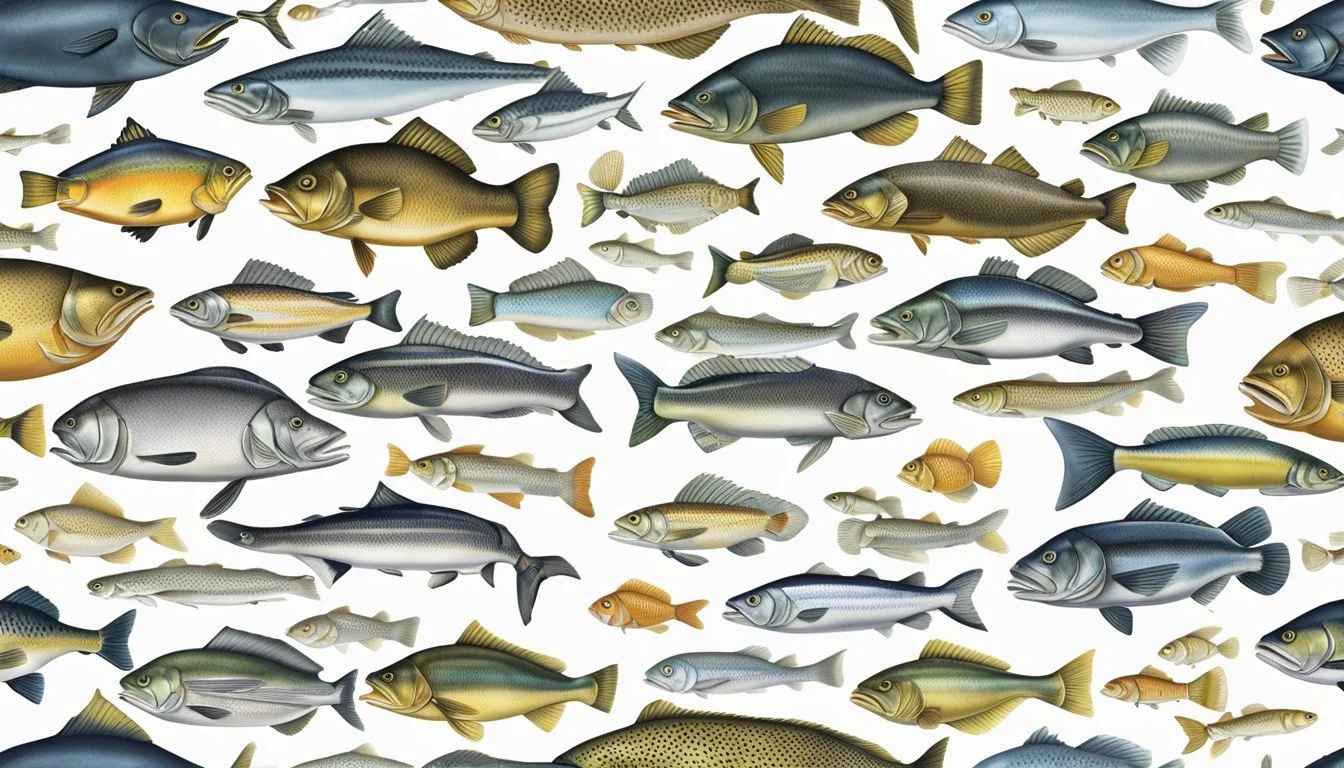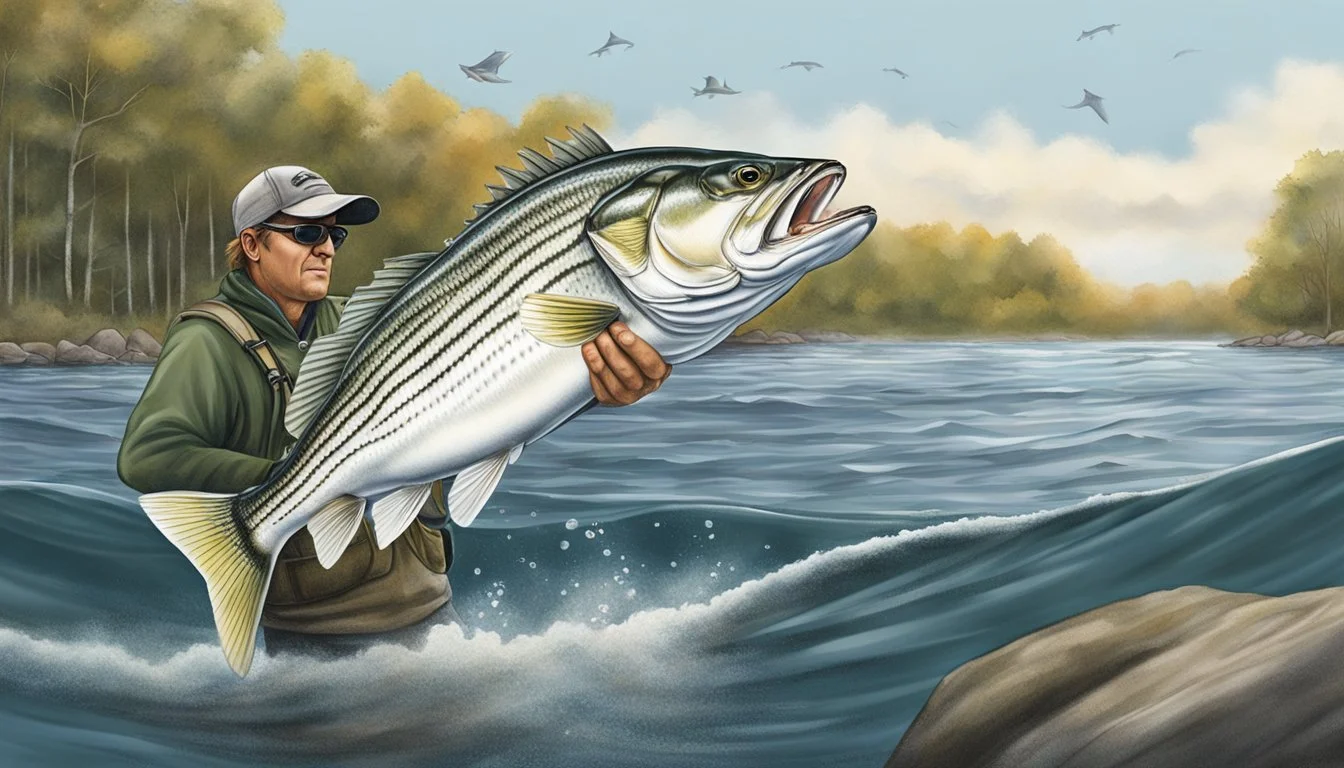Best Fish to Catch and Eat in Massachusetts
A Local Angler's Guide
Massachusetts is renowned for its rich maritime heritage and offers an array of fish (What wine goes well with fish?) that are both a pleasure to catch and delicious to eat. Anglers find the state's numerous streams, rivers, lakes, ponds, and coastal waters teeming with species such as striped bass, known for its sporty catch and delectable taste. The commonwealth's diverse ecosystems provide ideal habitats for various fish, making it a prime destination for fishing enthusiasts.
Safety and sustainability are paramount concerns when choosing fish to consume in Massachusetts. While the vast majority of fish caught in local waters are safe to eat, it is essential for pregnant women and others at higher risk to be cognizant of fish consumption advisories. These guidelines help ensure the enjoyment of Massachusetts' fishing offerings without compromising health, highlighting which species are safest to enjoy from a nutritional perspective.
The best seasons for fishing in Massachusetts tend to be during the summer and fall months, with early morning and late evening being particularly productive times. Success in fishing not only depends on the angler's skill but also understanding the behaviors and patterns of fish throughout the year. Whether looking for the challenging fight of a smallmouth bass or the impressive size of a catchable striped bass, Massachusetts's waters cater to a range of preferences for recreational and culinary experiences.
Choosing the Right Fishing Spot in Massachusetts
Massachusetts offers a wealth of diverse fishing locations, from tranquil inland lakes teeming with bass to the bustling coastal waters ripe with bluefish and tuna (What wine goes well with tuna?). The state caters to a variety of angling preferences, whether one seeks the serenity of a freshwater pond or the thrill of deep sea fishing off the storied Cape Cod.
Iconic Lakes and Ponds
The state's interior water bodies like Wachusett Reservoir and Norton Reservoir are prime destinations for anglers seeking bass and a variety of trout species. The delights of shore fishing combined with a potential trophy catch make these freshwater spots highly appealing.
Lake Onota offers excellent opportunities for largemouth and smallmouth bass fishing, with recently-caught specimens reaching impressive weights.
Fishing Spots:
Wachusett Reservoir: Bass, Trout, Sunfish
Norton Reservoir: Largemouth Bass
Lake Onota: Largemouth, Smallmouth Bass
Famous Rivers and Streams
Rivers such as the Charles River and the Merrimack River are freshwater veins through Massachusetts, supporting a thriving ecosystem. Anglers usually find these streams to be highly
Understanding Massachusetts Fish Species
Massachusetts offers a diverse range of freshwater and saltwater fish species that cater to both the casual angler and the dedicated fisherman. The state's waters are home to fish that not only provide a challenging catch but also make excellent table fare.
Popular Freshwater Fish
Massachusetts' inland waters are populated with several species of bass and trout. The Largemouth Bass is a perennial favorite among freshwater anglers for its aggressive strikes and robust fights. Fishermen also target Smallmouth Bass, which are known for their aerial acrobatics and strength.
Trout species provide a different kind of freshwater fishing experience, with Brook Trout, Brown Trout, and Rainbow Trout being the most common. These fish are often found in the cooler waters of Massachusetts, providing excellent fly fishing opportunities.
For those in pursuit of something different, the Northern Pike is a toothy predator offering a formidable challenge, while the American Gizzard Shad and various species of sucker fish, such as the White Sucker, are also prevalent.
Here is a brief list of popular freshwater species:
Bass
Largemouth Bass (Micropterus salmoides)
Smallmouth Bass (Micropterus dolomieu)
Trout
Brook Trout (Salvelinus fontinalis)
Brown Trout (Salmo trutta)
Rainbow Trout (Oncorhynchus mykiss)
Other Species
Northern Pike (Esox lucius)
American Gizzard Shad (Dorosoma cepedianum)
White Sucker (Catostomus commersonii)
Sought-After Saltwater Species
Moving to the coast, the cold Atlantic waters are home to several sought-after sports fish. The Atlantic Cod is a historic staple, deeply rooted in Massachusetts culture and economy. Fishermen often seek the thrill of catching Striped Bass, which are known for their powerful runs and are commonly found along the coastline.
Bluefish, always ready to put up a fight, are a favored catch due to their aggressive nature and are an exciting challenge when caught with light tackle. Haddock, Pollock, and Flounder also populate these waters and are considered delicious when it comes to seafood cuisine.
Some fish suitable for both sport and table include:
Striped Bass (Morone saxatilis)
Bluefish (Pomatomus saltatrix)
Atlantic Cod (Gadus morhua)
Other Tasty Varieties
Haddock (Melanogrammus aeglefinus)
Pollock (Pollachius virens)
Flounder (Pleuronectidae spp.)
Recreational fishing in Massachusetts also offers opportunities to catch Black Sea Bass, delicious Scup, Tautog known for their tough fight, and seasonal migrants like Mackerel, Bonito, and False Albacore. Each species presents a unique challenge and reward, making Massachusetts a prime destination for the fishing enthusiast.
Effective Fishing Techniques and Tackle
The success of fishing in Massachusetts hinges significantly on the choice of appropriate techniques and tackle. Both freshwater and saltwater anglers can enhance their catch rates by employing proven methods and selecting the right bait and lures.
Freshwater Fishing Methods
In Massachusetts, freshwater anglers often find success with a variety of techniques. Fly fishing is popular, especially in river systems known for trout, such as the Hoosic River. A precise cast and the artful presentation of flies can yield rewarding catches. For targeting largemouth and smallmouth bass, methods like casting jigs or trolling with plugs are effective. These species respond well when anglers retrieve lures with an occasional jerking motion to mimic live prey.
Saltwater Fishing Tactics
Saltwater fishing tactics along Massachusetts's coast vary with the targeted species. For example, striped bass are pursued using trolling, casting, or jigging techniques. Anglers employ plugs, jigs, and eel imitations as lures. Squid and sea worms are also used as live bait for a more natural approach. Clams (What wine goes well with clams?) and shellfish can be effective, particularly for bottom-feeding fish.
Bait and Lure Selection
Selecting the right bait and lure is essential for both freshwater and saltwater anglers. Here's a quick guide:
Freshwater Lures and Bait:
Spoons and spinners: Excellent for trout.
Plastic worms: A staple for bass anglers.
Fly fishing assortments: Dry flies and streamers work well for various species.
Saltwater Lures and Bait:
Jigs: Great for simulating smaller fish or crustaceans.
Plugs: Effective for mimicking wounded baitfish to attract larger predators.
For live bait, worms are the go-to for freshwater, while clams, crabs (how long does crab last?), and eel are preferred in saltwater environments. Both live and artificial lures can be rigged using different hooks to enhance the effectiveness based on fish species and size.
Best Fishing Seasons in Massachusetts
Massachusetts offers a diverse range of fishing opportunities throughout the year, providing both freshwater and saltwater anglers with specific peak seasons for various species.
Freshwater Fishing Calendar
Spring (March - May):
Pre-Spawn: Fish are highly active in the cooler water.
Spawn: Bass fishing is rewarding, particularly in April.
Summer (June - August):
Early Summer: Ideal for catching trout in the cooler parts of lakes and rivers.
The presence of herring in the water can indicate a more productive bass fishing season, as bass feed on these smaller fish.
Fall (September - November):
Fishing for species like bass, pickerel, and northern pike is excellent as they follow the baitfish.
This period is marked by aggressive feeding in preparation for winter.
Winter (December - February):
Fishing can be challenging, but ice fishing for species like pike can be successful.
Saltwater Fishing Timeline
Spring:
Striped Bass begins to run, and flounder fishing starts to pick up.
Bluefish appear nearshore, following baitfish migrations.
Summer:
Bluefin Tuna season peaks, with the best chances of a catch found off the coast.
Striped Bass fishing remains steady, especially in estuaries and bays.
Fall:
Striped Bass and Bluefish are still abundant, offering excellent opportunities before migratory patterns shift.
Winter:
While options are limited, cod and haddock are available offshore for the intrepid angler.
Regulatory Compliance and Conservation
When fishing in Massachusetts, adherence to state regulations ensures both the health of aquatic ecosystems and the safety of those consuming the catch. Regulatory bodies provide oversight and feedback to maintain environmental balance and protect public health.
Fishing Licenses and Regulations
Massachusetts requires anglers to obtain a fishing license, with the specific type depending on whether one is a resident or non-resident, and the age of the fisher. The Massachusetts Division of Fisheries & Wildlife (MassWildlife) oversees the management of freshwater fisheries, including licenses issuance.
Key Regulations to Note:
Seasons and Bag Limits: Regulations are subject to change yearly, so anglers must check current year's guidelines.
Size Restrictions: Some fish have minimum size requirements to ensure young, reproductive-age fish are not overharvested.
Where to Obtain Regulations:
Official MassWildlife website.
Printed guides available at fishing license vendors.
Environmental Protection and Species Management
The Massachusetts Department of Conservation and Recreation (DCR) as well as the U.S. Environmental Protection Agency (EPA) play significant roles in protecting aquatic environments and ensuring sustainable fishing practices.
Conservation Efforts Include:
Habitat Preservation: Monitoring and improving water bodies to maintain fish habitats.
Species Monitoring: Keeping track of fish populations to inform regulations and conservation strategies.
Species Management Strategies:
Special Regulations: Certain waters have specific rules to protect sensitive species or ecosystems.
Public Education: Informing anglers on sustainable fishing behavior and the importance of following consumption advisories.
Public health advisories, especially concerning the consumption of potentially contaminated fish, are issued by the Massachusetts Department of Public Health. These advisories provide crucial feedback about which species are safe to eat, and are particularly targeted toward sensitive groups such as pregnant women, women who may become pregnant, nursing mothers, and young children.
Additional Resources for Massachusetts Anglers
The pursuit of angling in Massachusetts is highly supported by local resources, including experienced guides and active communities. These entities ensure that both novice and seasoned anglers can optimize their experience in the state's various fishing spots.
Local Fishing Guides and Charters
Massachusetts has a plethora of professional fishing guides and charter services, especially around coastal cities like Boston. They offer invaluable local knowledge of the best fishing spots and techniques.
Fishing Guides: Skilled individuals possess intimate knowledge of Massachusetts waters, offering both freshwater and saltwater fishing excursions.
Charter Services: These companies provide equipped boats for larger groups, ideal for offshore fishing ventures.
Angler Clubs and Communities
Joining an angler club or community can greatly enhance one's fishing experience. Such organizations often host events, share information on fishing spots, and advocate for conservation.
Angler Clubs: They facilitate social connections between anglers and provide a platform for knowledge exchange and organized fishing outings.
Online Communities: Through forums and social media, anglers connect, share stories, and provide updates on local fishing conditions.
By leveraging these resources, anglers in Massachusetts can expect to improve their skills, find community, and gain greater enjoyment from their fishing endeavors.
Family and Accessible Fishing Locations
Massachusetts offers a diverse range of family-friendly and accessible fishing locations that cater to both novice and experienced anglers. For freshwater aficionados, the Wachusett Reservoir is a top destination offering sizable populations of various fish species. The Quabbin Reservoir, the state's largest body of water, provides excellent opportunities to catch bass and pickerel while enjoying the scenic, peaceful environment. These reservoirs ensure ample space and facilities for families.
In Western Massachusetts, families can visit the Connecticut River near Lee, notable for its diverse aquatic life. Fishing from the riverbanks or a boat can yield impressive catches of catfish and more. For a different experience, the Housatonic River is known for its lively currents and areas teeming with fish like carp and smallmouth bass.
Buzzards Bay in southeastern Massachusetts allows families to do saltwater fishing from numerous accessible spots. Winter flounder and minnows are among the species anglers might encounter in the bay's shallow waters. Fishing is permissible throughout the year, designating this bay as a perennial favorite.
Bringing children for a picnic and fishing adventure is ideal at Walden Pond. The iconic site features easily approachable shores, and the pond's clear waters house fish species such as sunfish and perch, perfect for young and first-time fishermen.
Key Locations Target Species Notes Wachusett Reservoir Bass, Pickerel Large, accommodating area Quabbin Reservoir Bass, Pickerel Scenic, family-friendly Connecticut River Catfish, Carp Accessible banks and boating Buzzards Bay Winter Flounder, Minnows Year-round fishing Walden Pond Sunfish, Perch Ideal for beginners
Note: Before planning a fishing trip, one should always check the local regulations regarding fishing seasons and necessary permits.







